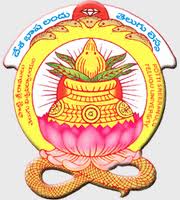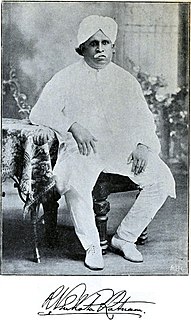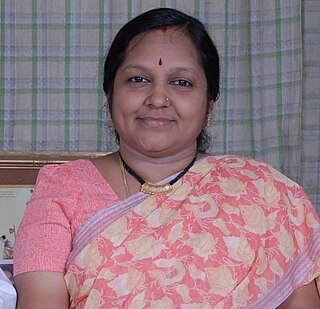
Rajahmundry, officially known as Rajamahendravaram, is a city in the Indian state of Andhra Pradesh. Located 200 km (120 mi) southwest of state's executive capital Visakhapatnam on the banks of Godavari River, it is the seventh most populated city in the state. During British rule, the District of Rajahmundry was created in the Madras Presidency in 1823. It was reorganised in 1859 and bifurcated into the Godavari and Krishna districts. Rajahmundry was the headquarters of Godavari district, which was further bifurcated into East Godavari and West Godavari districts in 1925. When the Godavari district was bifurcated, Kakinada became the headquarters of East Godavari and Eluru became the headquarters of West Godavari. It is administered under Rajahmundry revenue division of the East Godavari district. The city is known for its floriculture, history, culture, agriculture, economy, tourism, and its heritage. It is known as the "Cultural Capital of Andhra Pradesh".

Rao Bahadur Kandukuri Veeresalingam Pantulu was a social reformer and writer from the Madras Presidency, British India. He is considered as the father of the Telugu Renaissance movement. He was one of the early social reformers who encouraged the education of women and the remarriage of widows. He also fought against child marriage and the dowry system. He started a school in Dowlaiswaram in 1874. , constructed a temple known as 'Brahmo Mandir' in 1887 and also built the 'Hithakarini School' in 1908 in Andhra Pradesh. His novel Rajasekhara Charitramu is considered to be the first novel in Telugu literature.

There were eminent mridangam artists like "Mrudanga Kesari" Mullapudi Lakshmana Rao and his son Mullapudi Sri Rama Murty. And his disciple " Mrudanga Shiromani" Dharmala Rama Murty and his son Dharmala Venkateshwara Rao. There were other legends like ML Lakshminarayana Raju and Kamalakara Rao.

Kasinadhuni Nageswararao, better known as Nageswara Rao Pantulu, was an Indian journalist, nationalist, politician, and a staunch supporter of Khaddar movement. He participated in the Indian independence movement and in the Indian National Congress party, including Mahatma Gandhi’s civil disobedience movement through salt satyagraha. He was conferred with the title Desabandhu by the people of Andhra Pradesh. He was conferred with the title Desoddhaaraka by the Andhra Mahasabha. In 1935, the Andhra University honoured him with Kalaprapoorna, an honorary doctorate of Literature.
The Raghupathi Venkaiah Naidu Award is an award issued by the Indian state government of Andhra Pradesh, to recognise lifetime achievements in Telugu cinema. The award was introduced in 1981 in honour of Raghupathi Venkaiah Naidu, a pioneer of the Indian film industry. The winner is presented a Golden Nandi, a gold medal, a citation and a cash prize of ₹50,000 (US$700) at the Nandi Awards functions.

The Tank Bund Road runs between Hyderabad and Secunderabad, Telangana, India. The Tank Bund dams Hussain Sagar Lake on the eastern side and connects the twin cities of Hyderabad and Secunderabad. It has become an attraction with 33 statues of famous Telugu people.

The Potti Sreeramulu Telugu University (PSTU) is one of the few Indian language universities in India.
Khandavalli Lakshmi Ranjanam M.A. is doyen of Telugu literature and research from Andhra Pradesh, India.

Sivalenka Sambhu Prasad was a journalist and Indian National Congress politician, who took over the Daily News Paper Andhra Patrika, Andhra Sachitra Vara Patrika and Bharathi which were published from Chennai City which was the capital of Composite State of Madras from his father-in-law Kasinadhuni Nageswara Rao, the founder of Andhra Patrika group of publications in 1903, inventor of "Amrutanjan", a pain balm with natural ingredients, in 1893 and a freedom-fighter. After taking over he led the group of publications from 1938 to 1972. Rao also bequeathed all properties and Amrutanjan business to Sambhu Prasad, which he ran along with publications. During Sambhu Prasad's lifetime there were many important events in India, including the Second World War, the Independence of India, and much of the life, and the death, of Mahatma Gandhi. He was called "Ayyavaru" by his employees. The centenary of his birth was celebrated in 2011 by a function was attended by dignitaries and journalists, including Chief Minister of Andhra Pradesh Konijeti Rosaiah.

Dewan Bahadur Sir Raghupathi Venkataratnam Naidu was an Indian social reformer who hailed from Machilipatnam in Andhra Pradesh in India. His father Appayya Nayadu worked as a subedar in Madras Army. Their forefathers served as commanders in Madras Army and East Indian Company Army since its inception i.e. late 17th Century. He was a disciple of Veeresalingam, and has been described as "the most powerful orator of his day".
Pantulu means Guru in the South Indian language Telugu, and may refer to:

Dr. Seshulatha Kosuru is a leading Carnatic musician and teacher from Andhra Pradesh. She has performed widely in India and abroad and has received numerous awards and titles from many leading organizations. She has tuned and released many carnatic & devotional albums and has also set to tune many dance ballets.

Maharajah's College, or M. R. College, established in 1879, it is an autonomous institution located in Vizianagaram, Andhra Pradesh.
Maharajah's Government College of Music and Dance is an educational institution in Vizianagaram, Andhra Pradesh, India. It is the first music college in South India.
Jandhyala Papayya Sastry was an eminent Telugu writer and lyricist. He was popularly known as Karunasri because his writings expressively show compassion, one of the nine Rasas. His famous kavyas include Pushpa Vilapam and Kunthi Kumari.
Andhra Patrika was the weekly newspaper of the nationalist movement in the Telugu speaking region founded by Kasinadhuni Nageswara Rao in 1908. It later transformed into a daily newspaper before it closed down in 1991. It helped to shape both modern Telugu language and an identity that resulted in the creation of the state of Andhra Pradesh.

NTR: Kathanayakudu is a 2019 Indian Telugu-language biographical film, based on the real life and acting career of N. T. Rama Rao. It was produced by Nandamuri Balakrishna, Sai Korrapati Ranganatha, Vishnu Induri under NBK Films, Vaaraahi Chalana Chitram, Vibri Media banners and directed by Krish. The film stars Nandamuri Balakrishna, as his father N. T. Rama Rao, Vidya Balan in Basava Ramatarakam's role in her debut Telugu movie and music is composed by M. M. Keeravani. The film has a sequel, NTR: Mahanayakudu, that showcases the political journey of Rama Rao. The film earned pathetic reviews from audience.
Asavadi Prakasarao is an Indian poet, critic, translator and scholar, who is known for his poetry and prose works. He is noted for his significant contribution to Telugu and Sanskrit literature. In January 2021, he was awarded India's fourth-highest civilian award the Padma Shri in the Arts and Literature category. As Ashtavadhani, he has given 170 performances and has written and published 50 books across various genres. His most notable literary contribution is his performance of Avadhanam – a literary performance. He has received an honorary D Litt from Potti Sreeramulu Telugu University and a Distinguished Teacher award from the Department of Higher Education, Government of Andhra Pradesh.









